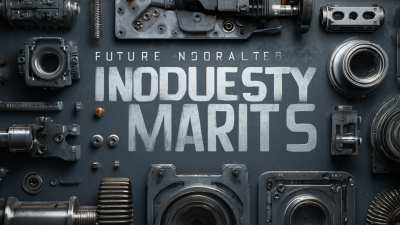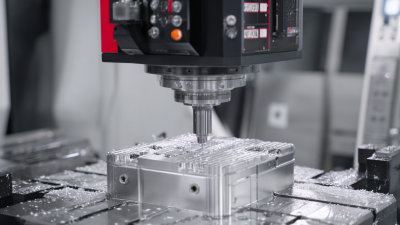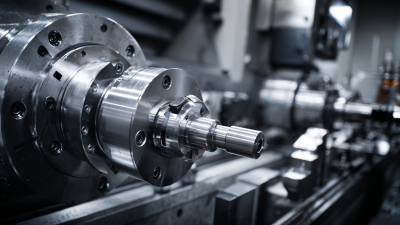Top Strategies for Sourcing Essential Parts Of Industrial Machine
In the rapidly evolving landscape of manufacturing and industrial operations, sourcing the right parts of industrial machines has become pivotal for efficiency and competitiveness. According to a report by the International Federation of Robotics, global sales of industrial robots are expected to reach approximately 2.1 million units by 2024, highlighting a significant demand for high-quality machine components that drive automation and productivity. Furthermore, the McKinsey Global Institute predicts that digital transformation in manufacturing could enhance productivity by up to 30%, emphasizing the importance of sourcing essential parts that align with advanced technological frameworks. As companies strive for operational excellence, understanding the top strategies for sourcing these critical machine parts will not only streamline production processes but also significantly bolster supply chain resilience in an increasingly complex market.

Understanding the Importance of Strategic Sourcing in Industrial Machinery
Strategic sourcing plays a pivotal role in the industrial machinery sector, ensuring that organizations can secure essential parts efficiently and cost-effectively. Understanding the nuances of strategic sourcing goes beyond merely identifying suppliers; it involves building long-term relationships and fostering collaboration. By doing so, companies can leverage supplier expertise, gain insights into market trends, and ultimately drive innovation within their operations. A strategic approach facilitates a deeper comprehension of supply chains, allowing businesses to anticipate challenges and mitigate risks effectively.
Furthermore, the importance of data analysis in strategic sourcing cannot be overstated. Organizations that employ data-driven decision-making can optimize their procurement processes, enhance inventory management, and improve supplier performance. By analyzing past purchasing patterns and market fluctuations, firms can negotiate better contracts, reduce lead times, and increase overall operational efficiency. Ultimately, understanding and implementing strategic sourcing not only empowers industrial machinery companies to maintain competitiveness but also supports their growth in an increasingly dynamic market.
Identifying Key Components for Efficient Machine Operation
When it comes to ensuring efficient machine operation, identifying key components of industrial machines is paramount. According to a recent report by MarketsandMarkets, the global industrial machinery market is projected to grow from $785 billion in 2023 to $1000 billion by 2028, highlighting the increasing importance of sourcing high-quality parts. A crucial aspect of this growth hinges on understanding the vital components required for optimal performance, including bearings, motors, and hydraulic systems.
To streamline operations and enhance productivity, manufacturers must focus on developing robust supplier relationships and employing advanced sourcing strategies. A study by Deloitte indicates that 79% of companies with high-performing supply chains achieve revenue growth significantly above their industry average. By identifying essential machine parts and leveraging data-driven supply chain management, organizations can minimize downtime, reduce maintenance costs, and ultimately improve efficiency. Investing in reliable suppliers who provide quality components is no longer just a choice—it's a necessity for staying competitive in the evolving industrial landscape.
Top Strategies for Sourcing Essential Parts of Industrial Machines
Assessing Supplier Reliability and Quality Standards
When sourcing essential parts for industrial machines, assessing supplier reliability and quality standards is paramount. The right supplier can significantly impact production efficiency, equipment longevity, and overall operational success. To begin, companies should evaluate potential suppliers by checking their credentials, certifications, and history in the industry. Engaging in a thorough background check can reveal past performance, adherence to safety regulations, and the timeline of delivery commitments. This information helps build a clear picture of the supplier's reliability.
In addition to reviewing credentials, quality standards play a crucial role in the selection process. A supplier should adhere to recognized quality management systems, such as ISO 9001, which ensures that they maintain consistent quality in their products. Conducting regular audits and requesting samples can further verify that the supplier's parts meet the required specifications. By prioritizing suppliers with robust quality assurance practices, businesses can mitigate risks associated with faulty parts, ultimately leading to reduced downtime and maximizing productivity on the factory floor.
Leveraging Technology for Optimized Parts Procurement
In the rapidly evolving landscape of industrial machine manufacturing, leveraging technology for optimized parts procurement has become more crucial than ever. According to a report by McKinsey, companies that incorporate advanced supply chain technologies can reduce procurement costs by up to 30%. This significant reduction not only enhances profitability but also allows for greater investment in innovation and product development. By utilizing data analytics, businesses can gain insights into supplier performance, inventory levels, and market trends—enabling informed decision-making and strategic sourcing.
Furthermore, the integration of machine learning algorithms in procurement processes is revolutionizing the way manufacturers source essential parts. A recent study from Deloitte highlighted that 60% of organizations adopting such technologies reported improved efficiency and reduced lead times. By automating routine tasks and predicting demand fluctuations, manufacturers can maintain optimal inventory levels and minimize downtime. As the industry continues to embrace digital transformation, leveraging these technologies will not only streamline procurement but also empower organizations to remain competitive in an increasingly demanding market.
Building Long-Term Relationships with Parts Suppliers
Building long-term relationships with parts suppliers is essential for industrial machine sourcing, particularly in an era where trust and collaboration are paramount. Trust in business can significantly affect supplier relationships; when employees and leaders establish open communication and transparency, it fosters a sense of partnership. This allows for better problem-solving and innovation, making suppliers more willing to accommodate special requests or adjustments in a timely manner.
Moreover, the manufacturing industry is navigating significant challenges, from digital transformations to ongoing skills gaps. Companies that prioritize building strong relationships with their suppliers can gain insights that enhance their competitive edge. Personalization of services, tailored to specific needs of both suppliers and manufacturers, plays a crucial role in this dynamic. When suppliers feel valued and understood, it not only leads to improved service levels but also increases the potential for collaborative growth and resilience in the supply chain. By investing in these relationships, businesses can better navigate the complexities of modern manufacturing while ensuring the seamless procurement of essential parts.
Related Posts
-

Future Trends in Industrial Machine Parts Market Analysis for 2025
-

5 Reasons Why Best Parts Machine is the Ultimate Choice for Global Buyers
-

Exploring the Top Examples of Best Parts For Machine Upgrades
-

The Future of Advanced Milling Machine Technologies
-

How to Choose the Best Metal Parts Machine for Your Manufacturing Needs
-

Understanding the Best Production Machine: Technical Specifications and Usage Guide for Global Buyers
